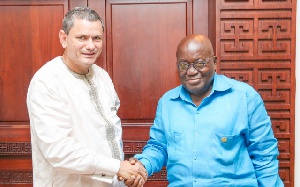President Nana Akufo-Addo has said that the production of local pharmaceuticals in the West African region is “a matter we have to pay maximum attention to”.
According to him, “there is absolutely no reason why we cannot develop the capacity [to produce our own medicine]”, adding that one of the priority industrial projects to be undertaken by his government would be the local production of pharmaceuticals.
The president made the comments when the West African Health Organisation (WAHO) paid a courtesy call on him at the Flagstaff House on Wednesday, 8 March to congratulate him on his electoral victory and also rally support for local production of pharmaceuticals in the West African region.
WAHO Director General Dr Xavier Crespin explained that the help of Ghana “in reinforcing local capacity to produce our own medicine” is of the utmost importance, as, “from our assessment, we produce only 25 per cent of the medicines we need in our region, which is very weak. Our objective is to increase it to 50%”.
For this reason, the Director General of WAHO urged President Akufo-Addo to “take the lead advocacy in this area”, adding: “We need political support from you to help us in terms of taxation, regulation, and harmonisation at ECOWAS level.”
The WAHO boss, who is on a three-day visit to the country, noted that Ghana is a major contributor to the ECOWAS Fund, and, as such, it is important to seek her advice in the implementation of key policy initiatives of the regional health body, as “we cannot implement some of the key activities without support of Ghana”.
He praised the country’s Universal Health coverage scheme, the National Health Insurance Scheme, which, he said, was being replicated in some West African countries. The area of traditional medicine, he added, is also one area in which Ghana is doing very well, in comparison with other countries.
On the plans put in place by WAHO to deal with pandemics, such as Ebola, he revealed that a regional Centre for Disease Control (CDC) had been established in Abuja, Nigeria, in this regard.
The establishment of the CDC is to ensure that “we are more prepared in terms of early detection, epidemic surveillance, training of our staff and upgrading their capacity, and research, so we can combat diseases of the nature of Ebola”.
Ghana, Dr Crespin added, “is serving as the platform for training of staff. The University of Ghana has been chosen for the training of staff in the Field Epidemiology and Laboratory Training Programme (FELTP).
“The Kofi Annan International Peacekeeping Training Centre (KAIPTC) is also training most of our medical staff who are part of the regional intervention team. This means we can mobilise quickly in sending out well-trained personnel in the event of an epidemic outbreak.”
President Nana Akufo-Addo also used the opportunity to urge the WAHO boss to place greater great emphasis on the processes for the control of malaria, which, he said, “continues to be a debilitating disease” in West Africa and on the continent.
President Akufo-Addo noted that in many parts of the world where malaria has been completely eradicated, even before the development of effective medication, one of the key strategies adopted was effective vector control, adding that Cuba had developed such a technology.
He, thus, urged WAHO to seek Cuban support for the construction of biolarvicide factories in West Africa to help eradicate malaria.
President Akufo-Addo assured Dr Crespin of Ghana’s continued commitment to the West African Health Organisation.
“We take our membership of ECOWAS and WAHO seriously, as was evidenced in the Ghanaian medical assistance that was provided during the outbreak of Ebola. We even had the decision of my predecessor, who had the courage to go into Guinea and Sierra Leone, at the time when everyone was boycotting them,” he added.
“These are all marks of Ghana’s solidarity with our brothers and sisters in ECOWAS, and that is what is animating us in supporting the work that you are doing.”
General News of Thursday, 9 March 2017
Source: classfmonline.com













